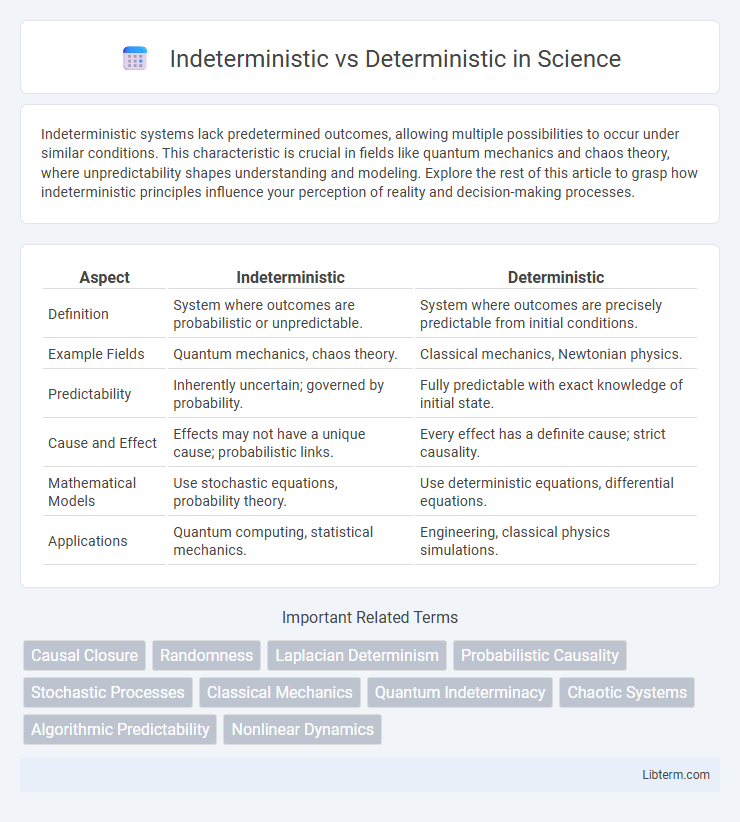Indeterministic systems lack predetermined outcomes, allowing multiple possibilities to occur under similar conditions. This characteristic is crucial in fields like quantum mechanics and chaos theory, where unpredictability shapes understanding and modeling. Explore the rest of this article to grasp how indeterministic principles influence your perception of reality and decision-making processes.
Table of Comparison
| Aspect | Indeterministic | Deterministic |
|---|---|---|
| Definition | System where outcomes are probabilistic or unpredictable. | System where outcomes are precisely predictable from initial conditions. |
| Example Fields | Quantum mechanics, chaos theory. | Classical mechanics, Newtonian physics. |
| Predictability | Inherently uncertain; governed by probability. | Fully predictable with exact knowledge of initial state. |
| Cause and Effect | Effects may not have a unique cause; probabilistic links. | Every effect has a definite cause; strict causality. |
| Mathematical Models | Use stochastic equations, probability theory. | Use deterministic equations, differential equations. |
| Applications | Quantum computing, statistical mechanics. | Engineering, classical physics simulations. |
Understanding Determinism: Definition and Principles
Determinism refers to the philosophical concept that all events, including human actions, are ultimately determined by causes external to the will, establishing a predictable cause-and-effect relationship within the universe. It relies on principles such as causal determinism, where every state of affairs is necessitated by preceding states according to natural laws. Understanding determinism involves recognizing its implications for predictability, free will, and the nature of reality in scientific and metaphysical contexts.
Exploring Indeterminism: Core Concepts
Indeterminism asserts that not all events are causally determined by preceding factors, allowing for genuine randomness or multiple possible outcomes in physical processes. Key examples include quantum mechanics, where particle behavior cannot be precisely predicted despite known probabilities, challenging classical deterministic models. This core concept emphasizes the role of probability and uncertainty in natural laws, reshaping philosophical and scientific understanding of causality and free will.
Historical Evolution of Deterministic and Indeterministic Thought
Deterministic thought originated in ancient Greek philosophy, with figures like Democritus and Aristotle emphasizing cause-and-effect relationships governing natural phenomena. The scientific revolution, propelled by Newtonian mechanics, solidified deterministic views by framing the universe as a predictable system governed by fixed laws. Indeterministic perspectives emerged prominently in the 20th century through quantum mechanics, challenging classical determinism by revealing inherent uncertainties and probabilistic outcomes in particle behavior.
Key Theories Supporting Determinism
Determinism is supported by key theories such as classical mechanics, which posits that every event or state is determined by preceding events according to natural laws, and Laplace's demon concept, which theorizes that if the complete state of the universe is known, its future can be predicted with certainty. Newtonian physics exemplifies determinism by describing a universe governed by predictable, cause-and-effect relationships. These theories emphasize a predictable and law-governed reality, contrasting sharply with indeterministic views that incorporate randomness or quantum uncertainty.
Notable Arguments for Indeterminism
Indeterminism posits that not all events are causally determined by preceding factors, allowing for genuine randomness and free will in physical and philosophical contexts. Notable arguments for indeterminism cite quantum mechanics experiments, such as the probabilistic behavior of subatomic particles and the violation of Bell's inequalities, which challenge deterministic frameworks. Furthermore, indeterminism supports the concept of moral responsibility by affirming that human actions are not preordained but can result from autonomous choice.
Determinism in Physics and Natural Sciences
Determinism in physics asserts that every event or state in the natural world is causally determined by preceding events according to physical laws, implying a predictable and fixed universe. Classical mechanics, formulated by Newton, exemplifies determinism through precise equations of motion that predict future states from initial conditions. However, modern physics, especially quantum mechanics, challenges strict determinism by introducing probabilistic outcomes in fundamental processes.
The Role of Indeterminism in Quantum Mechanics
Indeterminism in quantum mechanics manifests through the inherent unpredictability of measurement outcomes, where particles exist in superpositions described by wave functions. The probabilistic nature of quantum events, exemplified by Heisenberg's uncertainty principle and the collapse of the wave function, challenges classical deterministic views. This non-deterministic framework underpins phenomena like quantum entanglement and superposition, shaping interpretations such as the Copenhagen and many-worlds interpretations.
Philosophical Implications: Free Will and Causality
Deterministic philosophy asserts that every event is causally determined by preceding events, challenging the notion of free will by suggesting all actions are preordained. Indeterministic perspectives, often linked with quantum mechanics, introduce randomness and unpredictability, offering a framework where free will might exist independent of strict causal chains. The debate impacts metaphysics by questioning whether human autonomy is an illusion or a genuine capacity within an undetermined causal structure.
Real-World Applications and Consequences
Deterministic systems, such as classical mechanics and computer algorithms, provide predictable outcomes critical in engineering, aviation, and finance, enabling reliable decision-making and risk assessment. Indeterministic models, found in quantum mechanics and weather forecasting, introduce uncertainty that necessitates probabilistic approaches, affecting fields like cryptography, stock market analysis, and climate science. Understanding the balance between deterministic predictability and indeterministic uncertainty shapes advancements in technology, risk management, and scientific research.
The Ongoing Debate: Deterministic vs. Indeterministic Worldviews
The ongoing debate between deterministic and indeterministic worldviews centers on whether all events are causally determined by preceding factors or if true randomness and inherent unpredictability exist in nature. Deterministic theories assert that given initial conditions and natural laws, future states can be precisely predicted, while indeterministic perspectives highlight quantum mechanics and chaos theory as evidence of fundamental uncertainty. This philosophical and scientific discourse influences interpretations in physics, neuroscience, and free will, shaping our understanding of reality's predictability versus stochasticity.
Indeterministic Infographic

 libterm.com
libterm.com